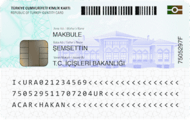Republic of Turkey Identity Card
| Republic of Turkey Identity Card | |
|---|---|
 Republic of Turkey Identity Card (obverse) | |
 (reverse) | |
| Issued by |
|
| Valid in |
|
| Type of document | Compulsory identity document |
The Republic of Turkey Identity Card (Turkish: Türkiye Cumhuriyeti Kimlik Kartı) is compulsory for all Turkish citizens from birth. The Turkish police are allowed to ask any person to show ID, and refusing to comply may lead to arrest. It can be used as a travel document to enter Northern Cyprus,[1] Georgia[2] and Ukraine[3] instead of a passport.
History
Identity cards, theoretically obligatory for all citizens, male and female, existed already in the late Ottoman Empire. They were known in Turkish as nüfus tezkeresi.[4] To the Slavic subjects of the Ottoman state they were known colloquially as nofuz (Bulgarian: нофуз).[5][6]
ID cards (1927-1991)

Turkey issued ID cards (Turkish: Nüfus Hüviyet Cüzdanı) with 1927 census in Ottoman Arabic letters. With Turkey's change to Latin alphabet, ID cards are changed to Latin in 1928. Surnames are added after 1934, with the Surname Law. Newer ID cards are issued in 1976, however old cards were still valid until 1991.
ID cards (1976-2022)
Turkey issued ID cards (Turkish: Nüfus Cüzdanı) for all citizens beginning from 1976. The cards are 7x9 cm in size and have gender specific color (Orange/red for females, blue for males). Starting from 1999, cards are issued with Turkish Identification Number. Cards have embossed stamp for security.
New identity cards (2017-current)
Ministry of Interior of Turkey issued an EU-like identity cards (Turkish: Kimlik Kartı) for all Turkish citizens. New identity cards are biometric as well as passport, and can be used as bank card, bus ticket or at international trips. Starting from 02.01.2017 these new ID cards are issued all around Turkey. [7] Unlike previous cards, new cards have 10 years of validity. They are in ID-1 (credit card) size, smaller than previous cards. The cards are gender-neutral for all citizens.[8]
See also
- Turkish passport
- Visa policy of Turkey
- Turkish Identification Number
- Turkish nationality law
- Visa requirements for Turkish citizens
Notes
- ↑ http://mfa.gov.ct.tr/consular-info/visa-regulations/
- ↑ http://www.mfa.gov.tr/relations-between-turkey-and-georgia.en.mfa
- ↑ http://mfa.gov.ua/en/consular-affairs/entering-ukraine/visa-requirements-for-foreigners
- ↑ Chris Gratien, Ottoman Identity Card; includes images of the cards
- ↑ Kunchov, Vasil (1900), Makedonii͡a, Sofia: Bulgarskoto Knizhevno Druzhestvo, p. 135 (in Bulgarian)
- ↑ http://ekimlikrandevu.com/wp-content/uploads/2016/02/e-kimlik-randevu-alma-2.jpg
- ↑ http://ekimlikrandevu.com/wp-content/uploads/2016/02/e-kimlik-randevu-alma-2.jpg
- ↑ "Ehliyet yenileme ücreti ne kadar? (Ehliyet yenileme işlemleri)". NTV. Retrieved 21 January 2017.